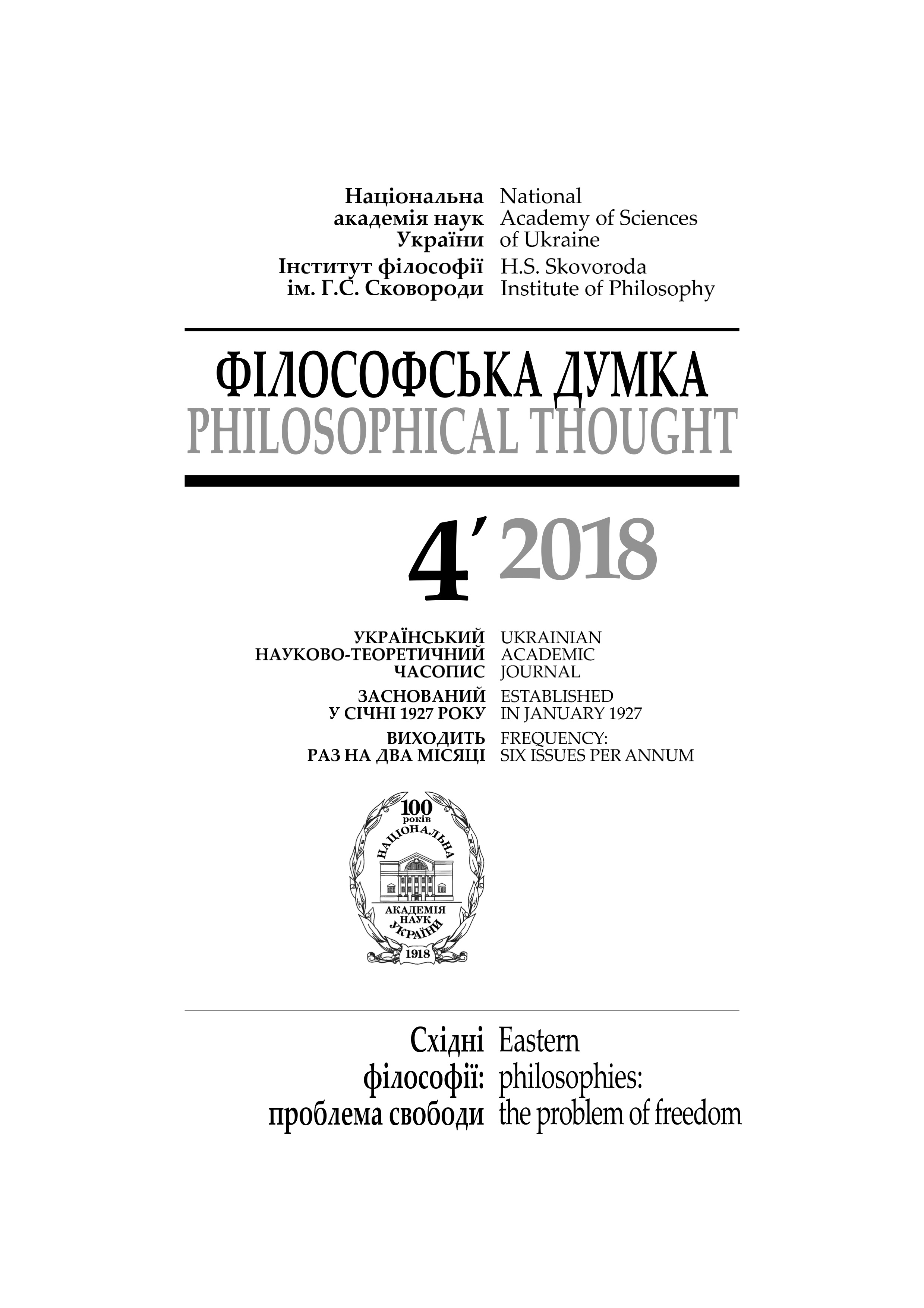Moral Heuristics: the History of Research
SOCIAL PHILOSOPHY
Keywords:
heuristics, moral heuristics, social heuristics, attribute substitution, consequen- tialism, moral intuitionAbstract
The paper presents an analytical review of main studies of moral heuristics. Studies of moral heuristics result from the expanding of the scope of the studies of heuristics (methods that give opportunity to make decisions with minimal cognitive efforts) to the domain of mo- rality. Accordingly moral heuristics are the methods that make moral decision-making easier. These methods mostly include the use of simple norms (“do not kill”, “do not steal”), the decision-making based on emotional reactions, the use of simple rules such us “imitate your peers or somebody authoritative”, “follow default behavior” etc. Although researchers agree that in everyday life people make moral decisions using heuristics, they have different opinions according to their effectiveness: some of them focus on fallibility of such decisions while others — on their correctness. In this connection the problem of the criterion of correctness of moral decision is quite urgent. The significance of the re- search of moral heuristics for moral philosophy, firstly, relates to the fact that such research can make a significant contribution to solving some of its key problems: to propose new arguments for discussion between deontological and consequential ethics; to clarify nature and status of moral intuition and the role of emotions in moral life of a person.
References
Alfano, M., Don, L. (2017). Experimental Moral Philosophy. In E. Zalta (ed.), The Stanford Encyclopedia of Philosophy. Retrieved from: https://plato.stanford.edu/archives/fall2017/ entries/experimental-moral/.
Baron, J. (1993). Heuristics and biases in equity judgments: a utilitarian approach. In B.A. Mellers, J. Baron (eds.), Psychological perspectives on justice: Theory and applications (pp. 109–137). New York: Cambridge University Press. https://doi.org/10.1017/CBO9780511552069.007.
Baron, J. (1994). Nonconsequentialist decisions. Behavioral and Brain Sciences, 17 (1), 1–10. ht- tps://doi.org/10.1017/S0140525X0003301X.
Baron, J. (1998). Judgment misguided: Intuition and error in public decision making. New York: Oxford University Press.
Baron, J. (2005). Biting the utilitarian bullet. Behavioral and Brain Sciences, 28(4), 545–546. https://doi.org/10.1017/S0140525X05250094.
Bartels, D. M., Bauman, C. W., Cushman, F. A., Pizarro, D. A., McGraw, A. P. (2015). Moral Judgment and Decision Making. In G. Keren, G. Wu (eds.), The Wiley Blackwell Handbook of Judgment and Decision Making (pp. 479–516). Chichester, West Sussex: Wiley-Blackwell. https://doi.org/10.1002/9781118468333.ch17.
Borry, P., Schotsmans, P., Dierickx, K. (2004). Editorial. Empirical ethics: A challenge to bioethics. Medicine, Health Care and Philosophy, 7 (1), 1–3. https://doi.org/10.1023/B: MHEP.0000022001.91748.47.
Brink, D. O. (2014). Principles and Intuitions in Ethics: Historical and Contemporary Per- spectives. Ethics, 124 (4), 1–30. https://doi.org/10.1086/675878.
Bruers, S. (2013). Speciesism as a Moral Heuristic. Philosophia, 41 (2), 489–501. https://doi. org/10.1007/s11406-013-9420-y.
Driver, J., Loeb, D. (2008). Moral Heuristics and Consequentialism. In W. Sinnott-Armstrong (ed.), Moral Psychology, vol. 2: The Cognitive Science of Morality: Intuition and Diversity (pp. 31–40). Cambridge, MA: MIT Press.
Fischer, R. W. (2016). Disgust as Heuristic. Ethical Theory and Moral Practice, 19 (3), 679–693. https://doi.org/10.1007/s10677-015-9673-6.
Gigerenzer, G., Todd, P. M., & the ABC Group (1999). Simple heuristics that make us smart. New York: Oxford University Press.
Gigerenzer, G. (2008). Moral Intuition = Fast and Frugal Heuristics? In W. Sinnott-Armstrong (ed.), Moral Psychology, vol. 2: The Cognitive Science of Morality: Intuition and Diversity (рp. 1–26). Cambridge, MA: MIT Press.
Gigerenzer, G. (2010). Moral Satisficing: Rethinking Moral Behavior as Bounded Ratio- nality. Topics in Cognitive Science, 2 (3), 528–554. https://doi.org/10.1111/j.1756-8765. 2010.01094.x.
Haidt, J. (2005). Invisible fences of the moral domain. Behavioral and Brain Sciences, 28 (4), 552–553. https://doi.org/10.1017/S0140525X05330093.
Hauser, M.D. (2005). Sunstein’s heuristics provide insufficient descriptive and explanatory adequacy. Behavioral and Brain Sciences, 28 (4), 553–554. https://doi.org/10.1017/ S0140525X0534009X.
Kahneman, D., Shane, F. (2002). Representativeness revisited: Attribute substitution in intuitive judgment. In T. Gilovich, D. Griffin, D. Kahneman (eds.), Heuristics and biases: The psy- chology of intuitive judgment (pp. 49–81). New York: Cambridge University Press. https:// doi.org/10.1017/CBO9780511808098.004.
Liao, M. S. (2016). Are Intuitions Heuristics? In S. M. Liao (ed.), Moral Brains: The Neuroscience of Morality (pp. 312–330). New York: Oxford University Press. https://doi.org/10.1093/ac prof:oso/9780199357666.003.0014.
Messick, D. (1993). Equality as a decision heuristic. In B. A. Mellers, J. Baron (eds.), Psychological perspectives on justice: Theory and applications (pp. 11–31). New York: Cambridge University Press. https://doi.org/10.1017/CBO9780511552069.003.
Mikhail, J. (2005). Moral heuristics or moral competence? Reflections on Sunstein. Behavioral and Brain Sciences, 28(4), 557—558. https://doi.org/10.1017/S0140525X05380095 Shah, A.K., Oppenheimer, D.M. (2008). Heuristics made easy: An effort-reduction framework, Psychological Bulletin, 134 (2), 207–222. https://doi.org/10.1037/0033- 2909.134.2.207.
Simon, H. A. (1955). A behavioral model of rational choice. Quarterly Journal of Economics, 69 (1), 99–118. https://doi.org/10.2307/1884852.
Simon, H.A. (1956). Rational Choice and the Structure of the Environment. Psychological Review, 63 (2), 129–138. http://dx.doi.org/10.1037/h0042769.
Singer, P. (2005). Intuitions, heuristics, and utilitarianism. Behavioral and Brain Sciences, 28(4), 560-561. https://doi.org/10.1017/S0140525X05410092.
Sinnott-Armstrong, W., Young, L., Cushman, F. (2010). Moral intuitions. In John M. Doris and the Moral Psychology Research Group (eds.), The Moral Psychology Handbook (pp. 246– 272). New York: Oxford University Press.
Sunstein, C.R. (2005a). Moral heuristics. Behavioral and Brain Sciences, 28 (4), 531—542. ht- tps://doi.org/10.1017/S0140525X05000099.
Sunstein, C. R. (2005b). On moral intuitions and moral heuristics: A response. Behavioral and Brain Sciences, 28 (4), 565–570. https://doi.org/10.1017/S0140525X05460094.
Tetlock, P. E. (2005). Gauging the heuristic value of heuristics. Behavioral and Brain Sciences, 28(4), 562–563. https://doi.org/10.1017/S0140525X05430095
Tversky, A., Kahneman, D. (1974). Judgment under uncertainty: heuristics and biases. Science, 185 (4157), 1124–1130. http://dx.doi.org/10.1126/science.185.4157.1124.
Downloads
-
PDF (Українська)
Downloads: 258
Published
How to Cite
Issue
Section
License
Authors who publish with this journal agree to the following terms:
- Authors retain copyright and grant the journal right of first publication.
- Authors are able to enter into separate, additional contractual arrangements for the non-exclusive distribution of the journal's published version of the work (e.g., post it to an institutional repository or publish it in a book), with an acknowledgement of its initial publication in this journal.
- Authors are permitted and encouraged to post their work online (e.g., in institutional repositories or on their website) prior to and during the submission process, as it can lead to productive exchanges, as well as earlier and greater citation of published work (See The Effect of Open Access).


